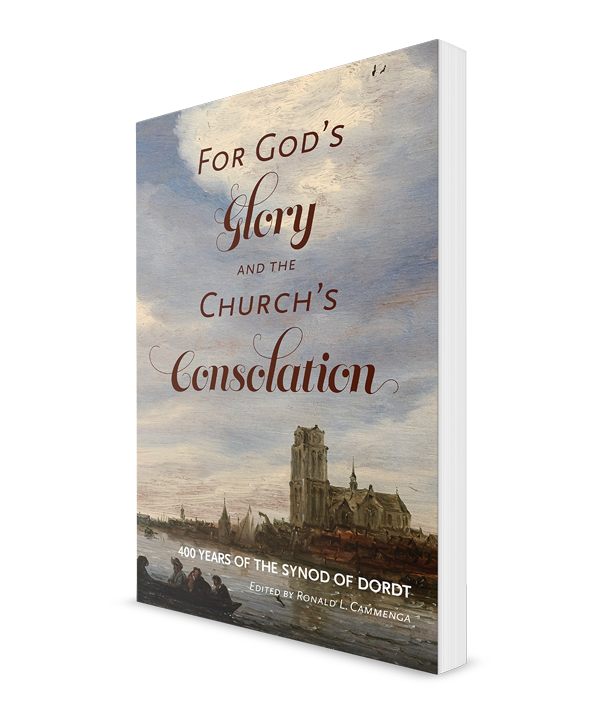The Idea of the Organic in Scripture (5)
Adam was the head of all God’s work in the universe—not only of mankind but also of the creation. He fell and plunged the entire human race into the darkness and hopelessness of total depravity. The curse of God came also on the creation itself. The curse fell on the ground because Adam sinned (Gen. 3:17), but in Romans 8:19-22 Paul tells us that the whole creation groans and travails under the curse, waiting for the salvation of the children of God.
This is important because it means, as the passage in Romans makes clear, that the creation that is under the curse shall be delivered with the sons of God, that is, in the redemption of the elect accomplished by Christ. We often forget that. Christ bore our curse but He also bore the curse of God on the creation. The result is that Christ’s headship over His elect people, who were “chosen ... in him before the foundation of the world” (Eph. 1:4), extends also over the whole universe so that He is head of all.
But there is more. Colossians 1:20 insists that Christ is the head of all things “in heaven,” as well as all things on earth. It is almost as if the apostle thinks we might doubt his statement that Christ is also the head of heavenly things and the heavenly creation. But so it is. Scripture teaches that Christ is Lord of all, including the new heavens and the new earth.
That, quite obviously, brings up a problem. Christ becomes head of the heavenly things by dying for them and redeeming them with His blood. But, if this is true, then the angels too now look to Christ as their head because He died for them, as well as elect humans. How is that possible?
It is possible because God created the angels also, probably on the sixth day when He created man—although Scripture does not tell us specifically. But the angels also were created as a corporate unity with the angel that is now the devil at the head—as Adam was in the original creation. When the devil rebelled against God, he took a large number of angels with him into his depravity, but the entire angelic world was responsible for his sin and became guilty in him.
Scripture refers to “elect angels” (I Tim. 5:21). Election and reprobation took place in heaven as well as on earth. In heaven, it took place immediately at the fall of Satan, though Satan was permitted in heaven until Christ’s ascension when He threw him out. In the old dispensation, Satan could still enter heaven, as during his tirades against Job (Job 1:6-12; 2:1-6; cf. Jude 9; Rev. 12:7-12). The last passage also explains why Christ is also the head of the elect angels. So it is clear that Christ died, and through His death and resurrection became the head of all the earthly and heavenly creation.
We must understand this. When originally God created the heavens and the earth, He created them as two separate creations. They were different in that the earth was physical and material, while the heavenly creation was spiritual. They were so different that the two could have no contact with each other, nor could angels come to earth and men go to heaven. But when the fall came, God began to work His eternal and highest purpose by making His own eternal Son head over all. He gave many indications of His plan and purpose. He promised Adam the “seed” who would crush the head of the serpent (Gen. 3:15). The Old Testament is the story of Christ and Satan in their bitter warfare that would culminate in the cross (Rev. 12:1-5). God kept reminding His people of His purpose by His miracles, prophecies and laws, as well as the visits of angels and the words of outstanding men who spoke of Christ’s coming.
When Christ was born of Mary, God came in our flesh in the greatest miracle that took place in all of history, for Christ came to die for both creations and for the elect in the angelic word and the elect here on earth. His resurrection from the dead shattered the barrier that had existed in the old dispensation. Christ startled, so to speak, heaven and earth. He arose from Joseph of Arimathea’s tomb—an event that is part of the history of this world. But He went through a door that He created and that opened in heaven. His resurrection was visible only in heaven and was seen there. And there He became head over all!
And so, in this new organism that will finally be perfected when Christ comes again, this earth is destroyed with fire, the elect are saved and all things, including heavenly things, are made new. Christ will be acknowledged as Lord of all. He will be the head of all. The old world will be burned with fire, elect humans and angels will be delivered from sin and death, and the whole creation will be united as one great organism to the eternal glory of God.
That is Scripture’s teaching on the great works of our God. We cannot celebrate His greatness without seeing how He has revealed Himself in His mighty works in His beloved Son: Christ, head over all; the elect, Christ’s own body; the elect angels, their “ministering spirits” (Heb. 1:14); and the whole new creation, heaven and earth, the everlasting possession of Christ and His church. The old organism will serve its purpose and be swept away in order to make room for this glorious organism.
How easy it is to lose sight of God’s glory in our preoccupation with earthly problems and things. How great is the glory of our God revealed in Christ and His cosmic work. How beautifully biblical revelation portrays all God’s works united to bring praise eternally to Him who has done it all. Let us lift up our eyes on high and worship Him whose works are past finding out. Prof. Herman Hanko
|



